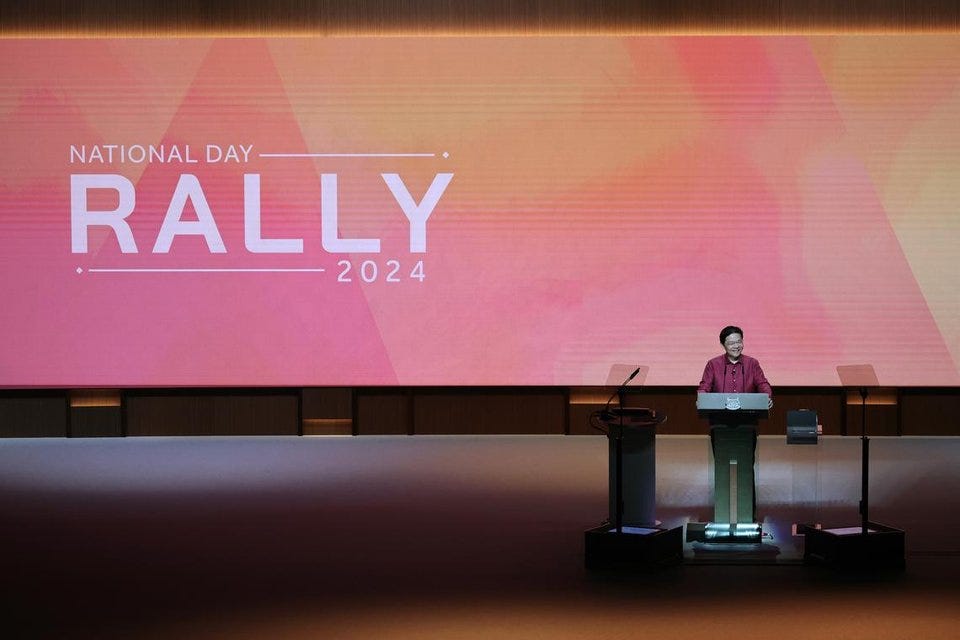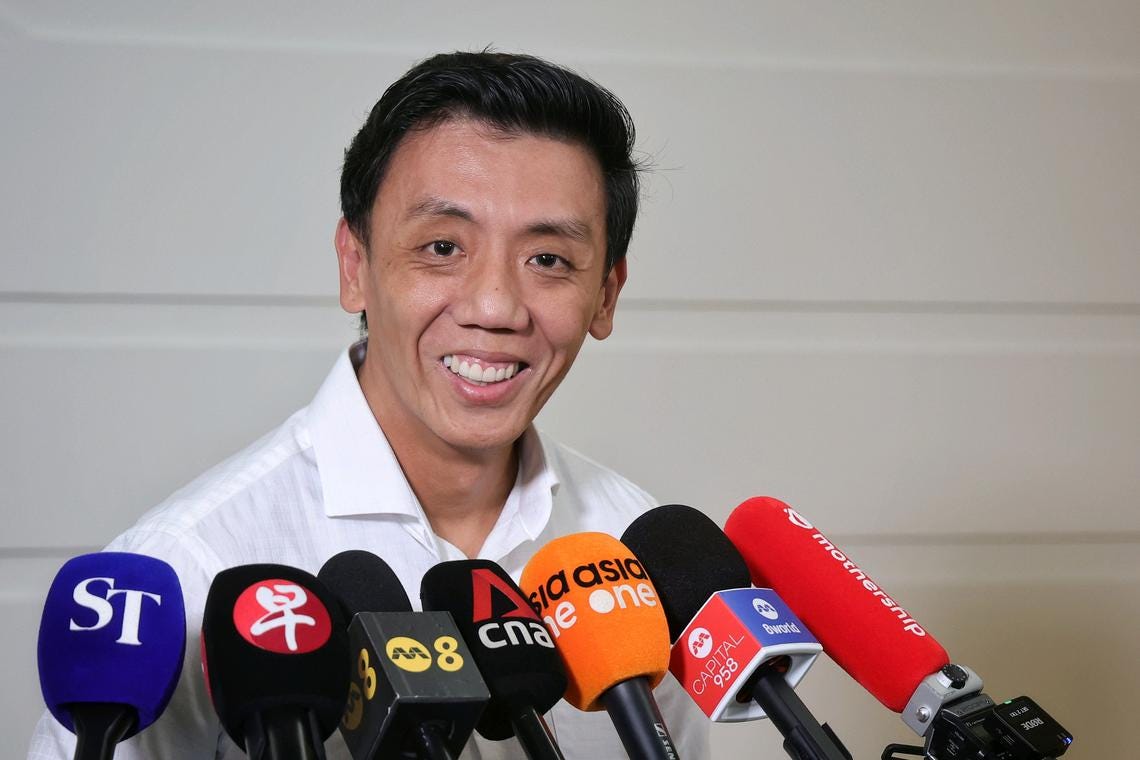Hi everyone,
Mark your calendars, we’ve got a date for the biggest political speech of the year: Aug 17.
It will be Prime Minister Lawrence Wong’s second National Day Rally and the first for this term of Government. The speech is usually full of big policy announcements, so expect a lot of news (and unpacking) before and after.
Also, PM Wong has nominated Speaker of Parliament Seah Kian Peng to continue in his role when the House reopens on Sept 5. Seah will have to be officially elected by MPs at the first sitting, but this is usually a formality. He has been Speaker since 2023, when he took over after Tan Chuan-Jin resigned.
PM Wong also appointed Minister in the Prime Minister’s Office Indranee Rajah to be Leader of the House, with SMS Zaqy Mohamad to continue as her deputy. They have both been in these roles since after the last election in 2020.
We find that it’s not always clear to the public what exactly these roles do so we’re thinking of doing a deep-dive on this ahead of Parliament reopening. Click to tell us if you want to read this: Yes / No
This week, we’ll look at the WP’s updates to its leadership body and new Acting Transport Minister Jeffrey Siow’s first sit-down interview with local media:
New blood in light blue
The news: The WP has expanded its leadership ranks with four MPs fresh from the polls.
The party announced last week that its central executive committee (CEC) has co-opted two rookie MPs and two new Non-Constituency MPs.
NCMP Eileen Chong will head the party’s youth wing, taking over from Sengkang GRC MP Jamus Lim.
Sengkang GRC’s Abdul Muhaimin Abdul Malik has been appointed deputy organising secretary, while Aljunied GRC’s Kenneth Tiong is now deputy treasurer.
NCMP Andre Low has been made deputy head of WP’s media team.
This followed a CEC meeting on June 17. No other changes were made and the leadership core remained with Pritam Singh as chief.
The take: The party usually co-opts candidates who have made it into Parliament as elected MPs or NCMPs.
However, this time it did not also co-opt unelected candidates, as it did after the 2015 election and between elections.
This tells voters and the rest of the WP that electoral success is crucial to rising within the party ranks, and that it is responsive to voters preferences in its internal power structures.
The party has also brought in the next generation, setting up for future leadership succession. Of the current CEC, only Sengkang’s Louis Chua is below 40 at 38. But Tiong and Muhaimin are 36, while Low is 34 and Chong, 33. Their inclusion brings down the average age of the CEC from about 47 to just over 44.
The co-opts set the four new MPs up with relatively high-profile roles ahead of Parliament’s reopening in September (Chong is arguably in the highest-profile role, and the only one not deputy to a more senior leader).
The party is due for a leadership election in about a year’s time, and their performance in these roles and in the House will be on the table when the rookies stand to earn their leadership spots in a ballot amongst its faithful.
Drive(r)less, move more?
The news: You might soon see self-driving minibuses and shuttles in your neighbourhood, moving you to MRT stations, CCs or polyclinics.
Acting Transport Minister Jeffrey Siow said in a June 11 interview that among his priorities is a big push for autonomous vehicles to be deployed across Singapore in the next five years to enhance the existing public transport network.
Siow had in June pledged to reduce travel time between Tengah (part of his Brickland ward is in it) and the city centre by adding more bus routes.
The take: Siow is pushing for autonomous vehicles with more enthusiasm than his predecessor Chee Hong Tat did, selling them not just as a way to cut public transport times but also as a solution to manpower shortages.
The minister, who is fresh to the top job as a politician but familiar with the Transport Ministry due to his past life as a civil servant, has a vision – and one that looks aligned with the rest of the Government's push for tech.
Other sectors across Singapore's economy are also facing a labour crunch, such as F&B and retail, healthcare and logistics. The struggle to find suitable and willing workers will only get worse as our birth cohorts (and subsequent labour force entrants) dwindle in size.
The government looks to be tapping technology – autonomous vehicles to solve the lack of bus drivers – to deal with the manpower issue on all fronts.
A man was shot in the lower back when cycling in a restricted area of the Central Catchment Nature Reserve that was gazetted for Singapore Armed Force live-firing. He is currently being investigated for wilful trespass.
Insurer Great Eastern surprised doctors and policyholders when it announced a pause in pre-treatment approval for those admitted to Mount Elizabeth hospitals, citing high costs. The Health Ministry said it would engage Great Eastern to better understand the impact of its decision while emphasising that insurers should ensure policyholders can benefit fully as per their contracts.
Health Minister Ong Ye Kung announced predictive artificial intelligence to be part of the next bound of Healthier SG, while assuring that humans are still irreplaceable. AI’s predictive powers, together with access to national health records, socio-economic and genetic data could help doctors predict many years in advance if someone is likely to develop serious conditions, he said.
With the 15th term of Parliament set to sit on Sept 5 with all 97 MPs and 2 NCMPs, one reader was curious: “When is the potential application deadline and selection timeline for the next round of NMPs?”
When Parliament dissolved earlier this year ahead of the May 3 polls, the seven (remaining) Nominated MPs also had to step down.
This is even though they had been appointed in July 2023 for a 2.5-year term.
NMPs are ‘crowdsourced’ rather than elected by vote.
A Special Select Committee comprising elected MPs will invite the public and certain groups – like the labour movement and social service organisations – to submit names for its consideration within a one-month window.
The committee can then appoint up to 9 NMPs from this group.
In 2020, this window was from Oct 26 to Nov 23 after the July election. After the September 2015 election, the nomination period was from Feb 2 to 23.
Based on this, we should expect it a month or two after Parliament reopens in September this year.
It is expected that the NMP scheme will continue, though it is not without its criticisms, especially after two NMPs resigned in February this year with intentions to run for political office. One of them, Dr Syed Harun Alhabsyi, is now MP for Nee Soon GRC. His compatriot, Raj Joshua Thomas, has also joined the PAP but did not stand for election, citing a desire to “earn his stripes” first.
The scheme has also had fewer nominations over the years.
The NMP resignations – which raised questions among the public on the impartiality of the role – and the uncertain interest could affect whether the scheme continues to exist down the road.












